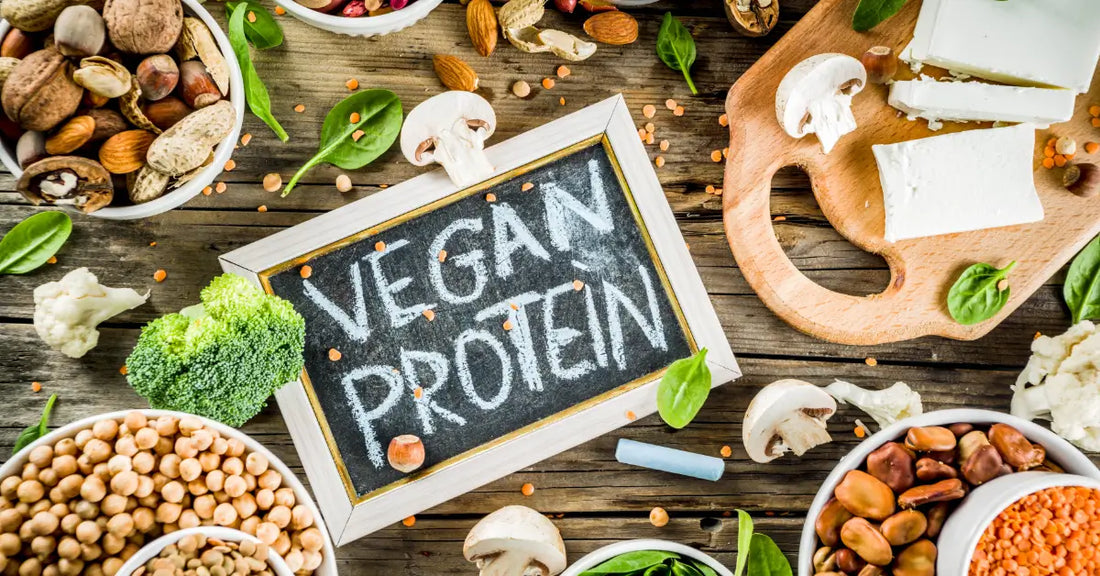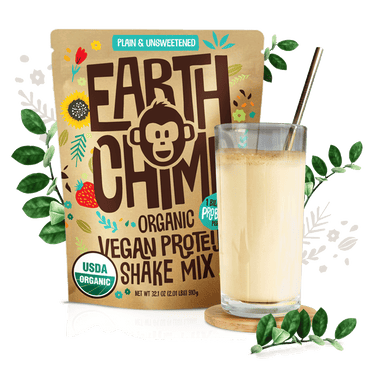Starting a vegan diet doesn't mean giving up protein-rich meals. You can learn how to get protein as a vegan and meet your needs easily. Plants offer many tasty protein sources to keep you healthy and full.
You can get enough protein on a vegan diet with some planning. It's about knowing what your body needs and which plants have protein.
There are lots of vegan protein options out there. Lentils, quinoa, and other plants all have protein plus other good stuff. This guide will help you make tasty, protein-rich vegan meals. You'll learn a lot, whether you're new to veganism or have been at it for years.
Understanding Protein Needs for Vegans
Recommended Daily Protein Intake
Understanding protein needs is key for vegans to stay healthy. The recommended daily allowance (RDA) for protein is 0.8 grams per kilogram of body weight for average adults who are not very active. But, this isn't a one-size-fits-all number.
Athletes, people who are very active, and older adults might need more protein. This is because their bodies require more protein to support muscle repair and growth. They also need it to maintain overall health.
The Importance of Protein in Your Diet
Protein’s Role in Your Body
Protein is essential for many functions in your body. It helps with muscle growth, tissue repair, energy production, and cell repair. It also moves oxygen around and aids digestion. Proteins play a role in controlling hormones. Without enough protein, these processes can’t function well.
Amino Acids and Plant-Based Protein Sources
Proteins are made up of 20 amino acids, nine of which are essential. These essential amino acids must come from food since your body can’t make them. A well-planned vegan diet can provide all the nutrients you need, but it’s crucial to eat a variety of plant-based proteins.
Including a range of protein sources in your diet is important. Foods like legumes, nuts, seeds, grains, and vegetables all contribute to your protein intake. Each type of food offers different amino acids and other nutrients.
Eating a variety of these foods helps you get a complete range of amino acids, which is key to a balanced vegan diet.
Balance and Planning in Your Diet
It’s also important to spread protein intake throughout the day. Eating protein with every meal helps your body use it more effectively and keeps your energy levels stable. This approach supports overall well-being by preventing energy dips and aiding muscle repair.
Remember, while protein is vital, balance is key. Your diet should include a mix of proteins, carbohydrates, fats, vitamins, and minerals to ensure a well-rounded nutrient intake. Planning meals with diverse protein sources can help you stay healthy and meet your dietary needs as a vegan.
Top Vegan Protein Sources

Legumes and Beans
Legumes and beans are great sources of protein for vegans. They also give you important nutrients and fiber. Here are some good ones:
- Lentils: 18g of protein per cup
- Chickpeas: 15g of protein per cup
- Beans (various types): 15-18g of protein per cup
- Green peas: 9g of protein per cooked cup
Eating beans can have extra health benefits too. They might help lower cholesterol, manage blood sugar, lower blood pressure, and reduce belly fat.
Soy Products
Soy products are some of the best plant-based protein sources. They are complete proteins, meaning they have all the essential amino acids. Popular soy-based proteins include:
- Tofu: 44g of protein per cup
- Tempeh: 34g of protein per cup
- Edamame: 18g of protein per cup
Tempeh also has other health benefits. It has probiotics, B vitamins, and minerals like magnesium and phosphorus. Edamame is rich in folate, vitamin K, and fiber, which helps with digestion.
Soy milk is another good option. It provides 6-8g of protein per cup, making it one of the highest-protein plant-based milk alternatives.
Nuts and Seeds
Nuts and seeds are great sources of protein, healthy fats, and other essential nutrients. On average, they have 5-7g of protein per ounce. Here are some options:
- Peanut butter: 7.2g of protein per 2 tablespoon serving
- Almond butter: 6.71g of protein per 2 tablespoon serving
- Hemp seeds: 31.56g of protein per 100g
- Pumpkin seeds: 29.8g of protein per 100g
- Chia seeds: 18.29g of protein per 100g
- Almonds: 20.33g of protein per 100g raw
Hemp seeds are also a good source of omega-3 and omega-6 fatty acids, which are good for you.
Whole Grains
Whole grains are important for a balanced vegan diet and can help with protein intake. Some protein-rich whole grains are:
- Quinoa: 8g of protein per cup
- Oats: 5g of protein per 0.5 cup dry
- Amaranth and teff: 10-11g of protein per cup
- Wild rice: 7g of protein per cooked cup
- Black rice: 16g of protein per cup
Oats aren’t a complete protein, but they have better quality protein than rice and wheat. Ezekiel bread, made from sprouted whole grains, has 8g of protein per two slices.
Vegetables and Fruits
Vegetables and fruits can add to your overall protein intake, even if they aren’t as protein-dense as other sources. Here are some examples:
Vegetables like broccoli, spinach, and asparagus provide 4-5g of protein per cooked cup. These veggies are not only nutritious but also easy to include in many dishes.
Fruits like guava, cherimoya, and mulberries offer 2-4g of protein per cup. They are tasty and can be a great addition to your diet.
Some specific protein content to consider:
Broccoli has 2.82g of protein per 100g when raw. Mushrooms have 3.74g of protein per 100g when cooked in oil.
Adding these veggies and fruits to your meals can help you get more protein in your diet.
Strategies for Meeting Protein Needs on a Vegan Diet

Planning Protein-Rich Vegan Meals
To meet your protein needs on a vegan diet, it's important to add protein-rich foods to every meal. Here are some tips:
- Start your day with a protein-rich breakfast, such as oatmeal mixed with nuts, seeds, and a scoop of plant-based protein powder.
- Use quinoa instead of rice for more protein in your meals.
- Add beans to soups, tacos, and salads.
- Include tofu or tempeh in stir-fries and salads.
- Use nutritional yeast as a cheese substitute for an extra protein boost.
Snacking for Protein
Snacks can help you get more protein throughout the day. Here are some protein-rich vegan snack ideas:
- Hummus with vegetables (hummus has 8.18g of protein per 100g)
- A handful of mixed nuts and seeds
- Edamame
- Chia seed pudding
- Smoothies made with plant-based protein powder
The Role of Fortified Foods in a Vegan Diet
Fortified foods can be really helpful in a vegan diet, especially for nutrients that are harder to get from plants. While not directly related to protein, fortified foods help vegans meet their overall nutritional needs. Look for fortified plant-based milk, cereals, and nutritional yeast for vitamins like B12, vitamin D, and calcium.
Enhancing Your Vegan Diet: When and Why
Signs You Might Need More Protein
You might need more protein if you notice:
- Frequent hunger
- Slow recovery from workouts
- Hair, skin, or nail problems
- Trouble maintaining or building muscle mass
Types of Vegan Protein Options
If you're finding it challenging to get enough protein from your diet alone, adding vegan protein options can be beneficial. Here are some choices:
- Pea protein powder
- Hemp protein powder
- Rice protein powder
- Soy protein powder
- Blended plant protein powders
When choosing a protein option, look for products with added B12 and other nutrients that can be scarce in a vegan diet. While these protein options are useful, they should complement, not replace, a diet rich in varied whole foods. Always consult a healthcare professional before introducing new protein options into your diet.
Wrapping Up Your Vegan Protein Journey

Getting protein as a vegan is easier than you'd think. There are lots of yummy plant options to choose from. Just mix things up to get all the good stuff your body needs.
On busy days, a vegan protein powder can help. Look for one that's natural and organic. Our EarthChimp powder blends pea, pumpkin, sunflower, and coconut proteins. It's all plant-based and has good bacteria for your gut.
Everyone's different, so your needs might be too. If you're not sure, talk to a nutritionist. They can help you make a plan that works for you.
Being vegan doesn't mean missing out on protein. You can eat well and feel great on plants. So try new foods and have fun with your healthy choices!
FAQ: Meeting Your Protein Needs on a Vegan Diet
How can vegans get enough protein?
Vegans can get enough protein by eating a variety of plant-based foods. Foods like beans, lentils, tofu, seitan, and whole grains like quinoa are all high in protein. Adding these to your meals ensures you meet your daily protein goals.
What are good sources of protein for vegans and vegetarians?
Good sources of protein for vegans and vegetarians include beans, lentils, tofu, tempeh, seitan, and spirulina. These foods contain a high amount of protein per serving and are great additions to a plant-based diet.
How many grams of protein per day should I aim for?
The recommended daily protein intake is about 0.8 grams of protein per kilogram of body weight. For example, if you weigh 70 kg (about 154 pounds), you'd need around 56 grams of protein per day. Athletes and very active people might need more.
Can I avoid protein deficiency on a vegan diet?
Yes, you can avoid protein deficiency on a vegan diet by eating a variety of protein-rich plant foods. Foods like beans, lentils, nuts, seeds, and whole grains are good sources of protein. Planning your meals to include these foods can help you meet your protein requirements.
Is a protein shake necessary for a vegan lifestyle?
While not necessary, a protein shake can help boost your protein intake, especially if you have higher protein needs. Plant-based protein shakes made from pea, hemp, or soy proteins are good options. They can be convenient for busy days or post-workout recovery.
Do grains like quinoa and brown rice help meet protein requirements?
Yes, grains like quinoa and brown rice are good sources of protein. Quinoa, in particular, is a complete protein, containing all nine essential amino acids. Including these grains in your diet can help you meet your protein needs.
References:
- https://www.ncbi.nlm.nih.gov/pmc/articles/PMC9963165/
- https://www.ncbi.nlm.nih.gov/books/NBK557845/
- https://www.medicalnewstoday.com/articles/vegan-protein-chart
- https://www.healthline.com/nutrition/protein-for-vegans-vegetarians
- https://www.webmd.com/diet/types-of-vegetarian-protein-sources
Disclaimer:
This statement has not been evaluated by the Food and Drug Administration. This product is not intended to diagnose, treat, cure, or prevent any disease.















